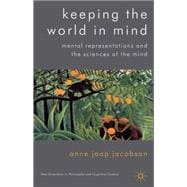There have been two major models of the mind's relation to its environment in Western though, both of which employ the term 'representation', but in quite different ways. The newer one, dominant today in philosophy, takes the mind to have states about its environment. The older concept, originating with Aristotle but still present in every day speech and in the new sciences of the mind, takes the mind to sample its environment. This book clarifies the old notion, solves some serious problems it faces, and explores the implications for philosophy of an awareness of the view of the mind emerging from cognitive neuroscience. Topics covered include concepts, perception, emotions, beliefs and actions.






